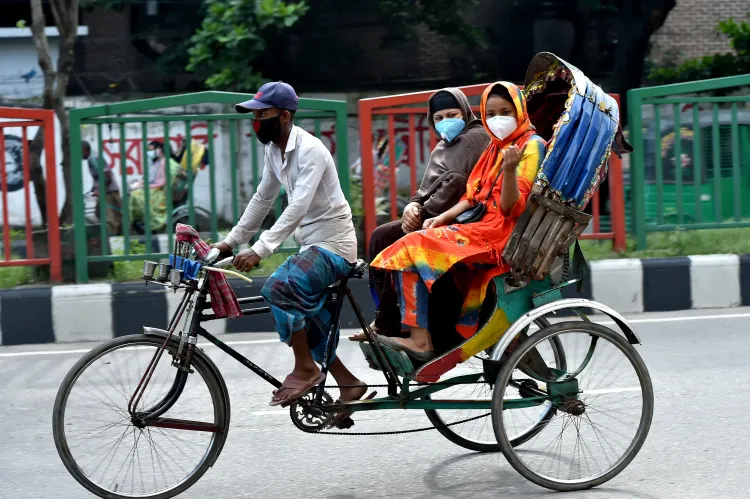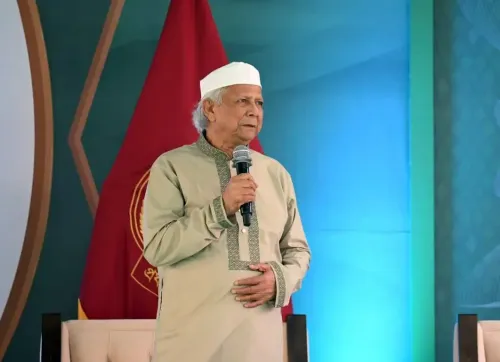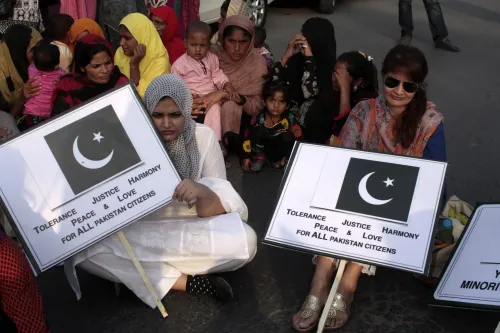Are Bangladesh's Women Becoming More Vulnerable in the Economy?

Synopsis
Key Takeaways
- Women in Bangladesh are increasingly vulnerable due to rising radicalism and social instability.
- Many have been forced to abandon economic roles for unpaid domestic work.
- Minority communities face the most severe challenges, with many women losing their jobs.
- Microcredit programs have weakened, limiting financial opportunities for women.
- Addressing these issues is crucial for the nation's economic health.
Dhaka, Sep 30 (NationPress) The economic contributions of women in Bangladesh are increasingly at risk, largely due to escalating radicalism, social instability, and systemic neglect, according to a report released on Tuesday.
The report highlighted that the pervasive lawlessness in Bangladesh, following the ousting of former Prime Minister Sheikh Hasina, has led to gender-specific repercussions, jeopardizing decades of advancement in the face of political turmoil.
"By mid-2025, civil society organizations documented over 200 instances where women vendors faced threats, assaults, or were coerced into abandoning their market stalls. Many have reverted to unpaid domestic roles, undoing years of progress. A similar narrative unfolds within the informal urban economy," the Sri Lankan newspaper Daily Mirror reported.
“Women street vendors, domestic help, and day laborers encounter heightened risks of abuse, non-payment, and violence, yet their stories often remain unreported, overshadowed by the broader political crisis plaguing the nation,” it continued.
The report pointed out that microcredit initiatives, many initiated by Muhammad Yunus, Bangladesh's Chief Advisor to the interim government through Grameen Bank, were once crucial for empowering rural women economically. However, these programs have significantly deteriorated under the Yunus-led interim administration from 2024-25.
"Women from minority communities endure the most severe hardships. In 2025 alone, over 49 Hindu educators, predominantly women, were compelled to resign from their positions due to threats and violence. Their displacement results not only in loss of income but also deprives communities of essential female role models," the report emphasized.
According to the report, earlier in May, mob violence in Jessore district, following the assassination of a Hindu leader, specifically targeted women's residences, with looting and intimidation aimed at forcing them into exile.
"When minority women lose their jobs, farmland, or businesses, their families frequently descend deeper into poverty. Yet governmental statements persist in minimizing the crisis, framing attacks as 'political' rather than communal, effectively erasing the gendered aspects of the violence," it asserted.
The report underscored that mob rule, exemplified by the 637 lynchings recorded in a single year by rights organizations, has fostered an environment of ongoing insecurity, where women are often the primary victims of such societal breakdowns.
"In early 2025, a university student in Dhaka faced harassment from supporters of a religious extremist. When she sought justice, mobs surrounded the police station, demanding her to drop the complaint and issuing terrifying threats of sexual violence. Instead of receiving protection, she faced pressure to remain silent. Incidents like these demonstrate how the collapse of law and order suppresses women's voices and discourages them from seeking education and employment — critical elements for their economic independence," it added.









